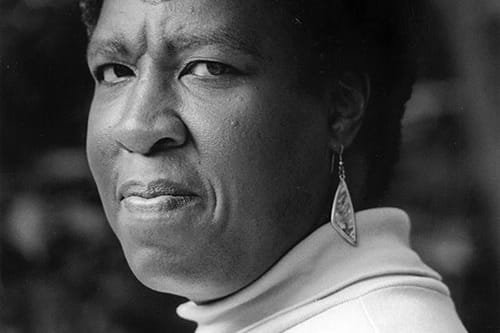
articles / Pop Culture
Sci-Fi Pioneer Octavia Butler Makes Her Way to TV

Octavia E. Butler, c. 1988. | Photo by Miriam Berkley
For several months, a room at The Huntington Library, Art Collections, and Botanical Gardens transported visitors into the fantastic mind of science fiction writer Octavia E. Butler. The exhibit Telling My Stories combined letters, manuscripts, images and journal entries to trace Butler’s life from her hard-scrabble upbringing in Pasadena to becoming the best-known female sci-fi author.
It was the kind of exhibit that couldn’t help but inspire – Butler’s desire to become an author was raw, her drive was unflagging, and her character sketches, research into Amazonian plants, and lists of ideas were fascinating.
Butler’s most popular novel might be Kindred, about an African-American woman who finds herself sent back in time to the antebellum South to help a white ancestor.
But Butler also wrote The Patternist series about a future in which humanity has become three genetic groups: powerful telepaths, diseased mutants, and mute humans.
In The Parable series, a community struggles for survival in a dystopian California after the socioeconomic and political collapse of America, while their leader, a young woman, prepares them for a future on another planet.

A working draft of “Kindred” with handwritten notes | Photo by Estate of Octavia E. Butler
And in her Xenogenesis trilogy, Butler writes about humans forced to coexist with other species to survive. Dawn, the first book is this series, is coming to TV. Award-winning director Ava DuVernay recently announced she’s adapting it for the small screen.
Butler used the worlds and characters she created to explore how hierarchical systems manipulate who can have power. She wrote about beings with fluid genders, powerful women, and she created nuanced black characters in a genre where people of color are often hard to find.
In the Huntington’s exhibit, viewers could read notes Butler wrote to herself reminding herself to “strive always, in all ways, at all times, always, for intensity. Cold or hot. Hard or soft. Gut-wrenching or deeply stilling. Utter intensity.”
Some of her notes list aspirations as things that will happen. “I write bestselling novels… My books will be read by millions of people … I will find the way to do this. So be it! See to it!”
The exhibition recently closed, but for more about Butler, listen to Arts Alive’s interview with Natalie Russell, assistant curator of literary manuscripts at The Huntington and curator of Octavia E. Butler: Telling My Stories.
And click here for archived discussions about Butler held at the Huntington.






